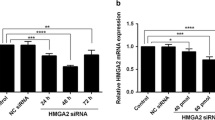Abstract
Objective
The aim of our study was to investigate the effects of Pin1 reduction on SW620 cell proliferation and apoptosis in human colorectal carcinoma.
Methods
We constructed a plasmid of RNA interfering (shRNA) for Pin1 gene (pGenesl-1-Pin1), then the plasmid was transfected into colorectal carcinoma SW620 cells line by liposome mediation. The protein expression of Pin1 was tested by Western blotting. The proliferation rate was analyzed by MTT and the apoptotic rate of cells was tested by flow cytometry. In order to explain further the effect of Pin1 in SW620 cells, the protein level of Bcl-2 was analyzed by Western blotting.
Results
pGenesil-1-Pin1 plasmid was successfully constructed and confirmed by sequencing. The protein relative levels of Pin1 were 0.06 ± 0.04 for the P-shRNA/SW620 cells, and 0.32 ± 0.09 for the P-Con/SW620 cells. The cell growth rate of SW620 cells was slower while the apoptotic rate was increased after transfection with pGenesil-Pin1 plasmid, and the apoptotic rate was 12.38% ± 1.55% for the P-shRNA/SW620 group. At the same time, we found that the protein expression of Bcl-2 was also reduced. The results were 0.13 ± 0.04 for the P-shRNA/SW620 cells, and 0.36 ± 0.08 for the P-Con/SW620 cells.
Conclusion
Inhibited Pin1 expression may suppress the cell proliferation and promote apoptosis of colorectal carcinoma cells in vitro.
Similar content being viewed by others
References
Weitz J, Koch M, Debus J, et al. Colorectal cancer. Lancet, 2005, 365: 153–165.
Rippmann JF, Hobbie S, Daiber C, et al. Phosphorylation-dependent proline isomerization catalyzed by Pin1 is essential for tumor cell survival and entry into mitosis. Cell Growth Differ, 2000, 11: 409–416.
Lu KP, Liou YC, Zhou XZ. Pinning down proline-directed phosphorylation signaling. Trends Cell Biol, 2002, 12: 164–172.
Lu KP, Zhou XZ. The prolyl isomerase Pin1: a pivotal new twist in phosphorylation signalling and disease. Nat Rev Mol Cell Biol, 2007, 8: 904–916.
Liu J, Zhao J, Yang JM. The expression of Pin1, β-catenin and cyclin D1 in elderly lung carcinomas and their significance. Chinese-German J Clin Oncol, 2008, 7: 379–382.
Mantovani F, Tocco F, Girardini J, et al. The prolyl isomerase Pin1 orchestrates p53 acetylation and dissociation from the apoptosis inhibitor iASPP. Nat Struct Mol Biol, 2007, 14: 912–920.
Yeh ES, Lew BO, Means AR. The loss of PIN1 deregulates cyclin E and sensitizes mouse embryo fibroblasts to genomic instability. J Biol Chem, 2006, 281: 241–251.
Ryo A, Hirai A, Nishi M, et al. A suppressive role of the prolyl isomerase Pin1 in cellular apoptosis mediated by the death-associated protein Daxx. J Biol Chem, 2007, 282: 36671–36681.
Butterfield DA, Abdul HM, Opii W, et al. Pin1 in Alzheimer’s disease. J Neurochem, 2006, 98: 1697–1706.
Xu YX, Manley JL. The prolyl isomerase Pin1 functions in mitotic chromosome condensation. Mol Cell, 2007, 26: 287–300.
Ryo A, Liou YC, Lu KP, et al. Prolyl isomerase Pin1: a catalyst for oncogenesis and a potential therapeutic target in cancer. J Cell Sci, 2003, 116: 773–783.
Blume-Jensen P, Hunter T. Oncogenic kinase signalling. Nature, 2001, 411: 355–365.
Bao L, Kimzey A, Sauter G, et al. Prevalent overexpression of prolyl isomerase Pin1 in human cancers. Am J Pathol, 2004, 164: 1727–1737.
Liu JY, Zhou JN, Chen SQ, et al. Pin1 overexpression in colorectal cancer and its correlation with β-catenin. Acta Univ Med Nan**g (Nat Sci) (Chinese), 2007, 27: 1138–1142.
Rippmann JF, Hobbie S, Daiber C, et al. Phosphorylation-dependent proline isomerization catalyzed by Pin1 is essential for tumor cell survival and entry into mitosis. Cell Growth Differ, 2000, 11: 409–416.
Li HY, Zhu T, Zhou JH, et al. Short hairpin RNA silences Pin1 and affects proliferation and apoptosis in HeLa cell line. Chin J Obstet Gynecol (Chinese), 2006, 41: 417–421.
Qin LY, Hao H, Li MN, et al. Decreasing Pin1 suppressed the properties of migratory and invasive in colorectal carcinoma SW620 cells. Chinese-German J Clin Oncol, 2010, 9: 216–220.
Hammond SM, Caudy AA, Hannon GJ. Post-transcriptional gene silencing by double-stranded RNA. Nat Rev Genet, 2001, 2: 110–119.
Huang KZ, Cai JC. The principle of RNAi and its application in tumor research. Med Recap (Chinese), 2010, 16: 72–74.
Kawasaki H, Altieri DC, Lu CD, et al. Inhibition of apoptosis by survivin predicts shorter survival rates in colorectal cancer. Cancer Res, 1998, 58: 5071–5074.
Author information
Authors and Affiliations
Corresponding author
Additional information
Supported by grants from the National Natural Science Foundation (No. 81000948/H1606), Natural Science Foundation of Shanxi Province (No. 2010011047-1), and University Science Technology Development Project of Shanxi Province (No. 20091013).
Rights and permissions
About this article
Cite this article
Zhu, Y., Qin, L., Li, M. et al. Pin1 expression affects cell proliferation and apoptosis of SW620 cells in colorectal carcinoma. Chin. -Ger. J. Clin. Oncol. 10, 100–104 (2011). https://doi.org/10.1007/s10330-011-0737-3
Received:
Revised:
Accepted:
Published:
Issue Date:
DOI: https://doi.org/10.1007/s10330-011-0737-3




